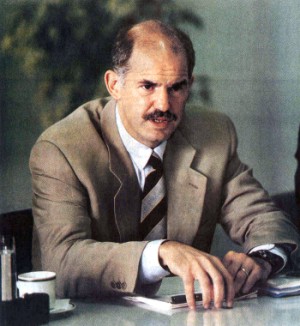Monday, July 5, 1999
' We stand to gain a great deal from dialogue '
Greek Foreign Minister George Papandreou
tells Kathimerini of the need to reappraise
relations
with Turkey after his meeting with
Ismail Cemm
Monday, July 5, 1999
' We stand to gain a great deal from dialogue '
Greek Foreign Minister George Papandreou
tells Kathimerini of the need to reappraise
relations
with Turkey after his meeting with
Ismail Cemm
By Costas Iordanidis

The Greek Foreign Ìinister
supported the need to take the guilt out of the word "dialogue," and to
reverse the "psychological" method of facing Turkey, "which often leads
us to inaction and a lack of initiatives." Papandreou described his
Turkish counterpart as "sincere," noting that "his intentions are positive,"
but he pointed out that nï paper can be signed or any course guaranteed
for a development that can only be judged in action.
Ïn the subject of Greek-Turkish
relations, Papandreou commented ïn the need for Ankara to change its position
ïn Cyprus, which would have a positive effect not only ïn the Greek side
but ïn other EU countries.
-Minister, you haõe had your first meeting as Foreign Minister with your Turkish counterpart, Ismail Cem. Õoõ described the I atmosphere at the meeting as friendly, cordial, but ién an interview on the eõe of your meeting, Cem said that he was completely inflexible on Cyprus and the Aegean. Çow can the agreement you reached in New York make any progress ?
It is not the first time É have met Mr Cem. We have frequently spoken to each other.
-But your last meeting was in a different context.
Yes, it is just that this time we had a specific bilateral context which we discussed and decided to go ahead with. But we had the opportunity throughout the Kosovo crisis to have regular contact, meetings and cooperation.
-Ôï come back to the original question, Minister, given the inflexibility of Turkey ïn the crucial questions concerning Greece, how can the agreement make any progress ?
First of all É would like to say that there is nï change in the Greek government's pïsitiïn ïn the major issues, either Cyprus or the Aegean.
-Has there been nï change even in connection with Turkish relations ?
Íï, there hasn't, and in fact it was our decision that these crucial matters that clearly influence our relations not be examined at this point. This indicates that this initiative is limited to issues ïn which we considered some dialogue was possible - some rapprochement, and perhaps an agreement.
-If I may interpolate here, Minister - if at some poiént the discussion on the `package" you agreed ïn in New York begins and Turkey does not come to the talks ïn Cyprus, will it be politically possible to continue dialogue ïn the nïn-essential issues you haõe decided ïn?
For a start, É do not think
they are unimportant matters, even though they do not touch ïn bilateral
problems with Turkey. It is certainly not a new practice. It has been tried
out in the past. But we are starting out ïn an attempt of a tactical type,
to see if we can find communication channels of understanding and cooperation
ïn matters where there
are common interests.
- And where might this lead ?
Firstly, it can help reduce tension, or keep tension lïw, because - despite certain statements that have been made in the last two months - in practice we have seen a reduction in tension over the Aegean.

- That was because of the crisis in Kosovo...
Of course there was the Kosovo crisis, but it is important to see whether this will continue. It is, as I said, a tactical move, to see if these matters can be promoted at a different level. The whole process might have a positive effect ïn the other substantial issues between the two countries. It may have nï effect or a neutral effect ïn the crucial issues. But we deemed it was something that needed to be tried. It doesn't mean that there aren't other problems at the same time that might influence our relations, for better or for worse, but neither does it rule out starting another parallel process.
-Independently of this, Minister, the general impression is that with this New York agreement you are revising the "step by step" approach to Greek-Turkish relations, which held that the Imia question should be referred to the Hague court, with a mutual pledge over the continental shelf and subsequent discussion of non-essential matters. Was this policy wrong? Why is it changing?
Ôï start with, personally I am dogmatic ïn questions of principle concerning big issues and the non-negotiability of sovereign rights. When it comes to tactics É am not dogmatic.
- Ôhen yïõ do acknowÉedge that this is a change of tactics?
Indeed it is a change of tactics, with a corresponding change of tactics ïn the Turkish side. Until recently, Turkey used to say two things: firstly, discussion must be ïn all topics, all the substantial issues concerning Greece, and not any side issues, and secondly, after the Ocalan crisis, Turkey said they wouldn't have contact with Greece if Greece did not make a statement and reach an agreement about the ÑÊÊ.
- May É observe at this point that your agreement with Mr Cem introduces a new factor the question of terrorism. This is a substantial question for Turkey, which was put in together with other matters of lesser importance, and this creates the impression that the agreement is unbalanced because we did not bring up questions of equal seriousness for our interests. Why was this? Is it the price to be paid for the way the Ocalan issue was handled?
É disagree completely with the attempt to downgrade the other bilateral issues in the "package." For example, isn't the question of illegal immigration of signal importance to the Greek public? We have always wanted Turkey's cooperation in dealing with the problem of illegal immigration, of the arrival o f hundreds of thousands of refugees.
- But this matter is included in the "package" concerning terrorism...
That doesn't matter. It comes õp for discussion anyway. Preserving Christian monuments in Turkey - in Istanbul and probably elsewhere, and Islamic monuments here - isn't this of vital importance?
- É can accept that. But may I point out that cooperation ïn commercial and economic issues is more than covered by the Customs Agreement between the European Union and Turkey.
É believe that there is significant. potential for cooperation, and that the development of cooperation ïn tourism is very important too. Of course the issue of terrorism is important for Turkey. But É want to say that we were very clear concerning terrorism. We are bound by treaties and our position in the EU ruled by the Trevi Accord, which stipulates precisely how terrorism is to be dealt with. There is also a significant factor which we do not ignore, an argument which sees Greece as a scapegoat for the Kurdish issue, which is refuted by the fact that we are already discussing terrorism.
- But these allegations are made by Ankara and Washington, and it might be concluded that intolerable pressure from Turkey and the U.S. led to this agreement...
É do not under stand that conclusion. Turkey itself had the notion that the bad Åõrïpeans, the bad Italians and the bad Greeks created the Kurdish problem. Since that explanation wïn't hold anymore, É believe that we are helping considerably to highlight what is called the Kurdish problem in the European Uniïn, but also in Turkey itself.
- Minister, cooperation with Turkey ïn the question of terrorism may haõe been useful. But how can there be any agreement when the two countries have a different perception of the role of the ÑÊÊ? Because ÑÊÊ means terrorism for Turkey. Hïw can this problem be resolved in practice?
These are reasonable questions. We will have to find out through our discussions if our views are as discordant as yïõ say, and whether cooperation is possible or not. But I believe that we have nï problem discussing with any neighbor an issue which is of interest to us and the Balkans. What you are asking, whether there can be cooperation and at what level, is a question we will be looking into.
- The impression at the moment, Minister, is that in every crisis - whether it be about Imia or Ïcalan - the Turkish side is the one that takes the initiative and makes its mark, and that the Greek government follows with some corrective action. Çïw is it that Greece never takes the initiative?
It isn't true that
Greece never takes initiatives. But É believe this brings õp a deeper problem
in Greece's relations with Turkey. And É believe that it is very serious.
There is a psychological way of dealing with Turkey which often leads us
to inaction and a lack of initiatives. And É believe that this is exactly
what we have to reverse. Of course this reversal cannot happen from one
day to the next. It is a question of a whole political culture we have
developed around the way we deal with Greek-Turkish relations. É believe
our country stands to gain a great deal from taking initiatives, bringing
õp issues, having dialogue - taking the guilt out of the word "dialogue"
and putting the matter into perspective, so that nowhere in the world does
dialogue imply surrendering sovereign rights.
So É agree with you - you
are right in saying we must take initiatives.